|
|
|
Issue:
7 |
December 23, 2008 |
|
Dear Soaring Enthusiast,
Merry Christmas!!! I hope you have
a wonderful holiday
season with family and friends and a that the new
year brings you joy. My family is looking
forward to celebrating Jesus' birth and, of course,
the kids are very excited about opening presents
from Santa and family.
Winter has
definitely set in here in Minnesota. It has
been an especially cold and snowy start to winter.
Yesterday I enjoyed some sledding on a large nearby
hill with my daughter Sara. I am looking
forward to some downhill skiing with my son Adam and
ice skating with both Elle and Sara. And yet I
am already looking forward to getting the gliders
out in spring.
Christmas
Card
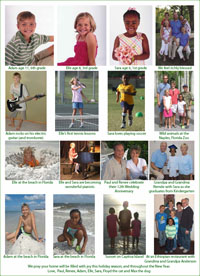 Every
year I have a lot of fun pulling together my
favorite family photos and putting them onto a photo
page to send out as our annual Christmas card.
I'm a very proud father and husband, so I have made
it available as a PDF for you to see here:
Remde Family Christmas Card.
It looks better when printed onto Christmas paper
with a colorful border, but at least you can see the
photos. As you can see in the photos, it has
been a wonderful and fun year. Every
year I have a lot of fun pulling together my
favorite family photos and putting them onto a photo
page to send out as our annual Christmas card.
I'm a very proud father and husband, so I have made
it available as a PDF for you to see here:
Remde Family Christmas Card.
It looks better when printed onto Christmas paper
with a colorful border, but at least you can see the
photos. As you can see in the photos, it has
been a wonderful and fun year.
Christmas
Song Lyrics
A few years ago, I collected a bunch of lyrics to
Christmas songs into a 3 page PDF file. You
are hereby challenged to print it and sing the songs
with your loved ones this holiday season.
Christmas Song Lyrics
Thank you for
taking the time to read the
newsletter. There is a lot of interesting
soaring news to report from around the world, and I
have been very busy adding new products to my web
site. I hope you will enjoy it. If
you do, please tell your soaring friends about it by
forwarding the following link to them:
http://www.cumulus-soaring.com/newsletters.htm
Note: Click on
the small images on this page to view much larger
versions of the images.
Good Soaring,
Paul Remde
|
|
NK ClearNav Update |


Production
ClearNav Units Shipping Now
It is an exciting time for NK - the first production
ClearNav units are now shipping! I have
several units sold and more on the way to me in a
few days. I can get as many as I can sell, so
please order from me.
I have been
asked recently whether I feel the ClearNav is ready
to ship. I can sincerely say yes, it is ready.
I have been playing with my ClearNav quite a lot
while working on writing the manual. The first
pre-release units were delivered to customers in
June of this year. Since then it has
been flying in gliders all over the USA.
NK has received a lot of very positive feedback on
the ClearNav. They have listened to their
customers and made some nice improvements to both
the hardware and software. The major changes
are listed below.
Software
Changes
The most noticeable change is that the "NIA"
(Numerical Information Area" on the bottom of the
screen has been replaced. Previously, it was
necessary to use the yellow Focus button to select
the NIA when you wanted to change the MacCready
setting or edit or view task data. While I
thought the previous arrangement was very easy to
use, I agree that it is now even easier. The
main Ribbon Menu is used to access the MacCready
setting and task data. The bottom of the
display is now used to display a variety of user
selectable flight data windows. I like the
changes very much. There are dozens of other
improvements as well.
Rubber
Bumper
It was decided that the metal edges on the ClearNav
could (theoretically) cause scratches to the glider
canopy if the ClearNav is mounted using a RAM arm,
and the glider is flown in rough turbulence - such
as on a ridge. Therefore they have created a
new rubber bumper that goes around the outside of
the unit. I haven't seen it yet, but it sounds
nice. I believe it will be standard equipment.
Nexus
Board - Now Nexus Junction Box
The Nexus board is a circuit board that mounts
either on the back of the ClearNav, or behind the
instrument panel. It worked well as a circuit
board, but it didn't look "finished". It will
now be enclosed in a box to make it look much
cleaner. I can't wait to see it.
 Behind
Panel Mount & Recessed Mounting Trim Behind
Panel Mount & Recessed Mounting Trim
The original "In-Panel" mount took up a lot of panel
real-estate because the hole in the panel had to be
as large as the entire ClearNav unit. A very
clever ClearNav user named Kolie Lombard came up
with a nifty mounting solution which NK is now
making a standard (and probably popular) mounting
option. The photos above and below show
Kolie's installation. He needed to fit the
ClearNav into his Diana 2's very small instrument
panel. The solution he came up with seems
obvious in retrospect, but no one else had thought
of it. As you can see in the photos, the
ClearNav is mounted recessed back into the panel.
The hole in the panel is
 the
size of the LCD display only - not the entire
ClearNav box. Notice that the instruments to
the sides and above the ClearNav are mounted very
close to the rectangular "tunnel" that goes back to
the ClearNav's LCD display. There are 2 huge
benefits to this mounting system. The first is
that the ClearNav is mounted back far enough such
that it does not interfere with instruments mounted
next to the LCD "tunnel". The second benefit
is that the ClearNav's display is mounted "in the
shade". That means that you can turn the
ClearNav's powerful backlight down - and use less
current - giving more flight time on your glider's
battery. NK will sell their version in 2
parts. The "Behind Panel Kit" makes it
possible to mount the ClearNav on the back of the
instrument panel - while making a hole in the panel
that is the size of the LCD display (not the entire
ClearNav). The 2nd (optional) part is the
"Recessed Mounting Trim", or "tunnel". It can
be used with the "Behind Panel Kit" to mount the
ClearNav back several inches behind the panel.
Brilliant!!! These new mounting options will be
available very soon. the
size of the LCD display only - not the entire
ClearNav box. Notice that the instruments to
the sides and above the ClearNav are mounted very
close to the rectangular "tunnel" that goes back to
the ClearNav's LCD display. There are 2 huge
benefits to this mounting system. The first is
that the ClearNav is mounted back far enough such
that it does not interfere with instruments mounted
next to the LCD "tunnel". The second benefit
is that the ClearNav's display is mounted "in the
shade". That means that you can turn the
ClearNav's powerful backlight down - and use less
current - giving more flight time on your glider's
battery. NK will sell their version in 2
parts. The "Behind Panel Kit" makes it
possible to mount the ClearNav on the back of the
instrument panel - while making a hole in the panel
that is the size of the LCD display (not the entire
ClearNav). The 2nd (optional) part is the
"Recessed Mounting Trim", or "tunnel". It can
be used with the "Behind Panel Kit" to mount the
ClearNav back several inches behind the panel.
Brilliant!!! These new mounting options will be
available very soon.
IGC
Approval - In Process
A ClearNav unit was sent to the IGC a few months ago
for IGC Approval testing. There have been some
back and forth communications between the IGC and NK
- which is good - it indicates that they are testing
it now. Approval is anticipated soon.
When approval is received the plan is to be able to
upgrade production ClearNav units with the new IGC
Approved software using the standard USB Flash Drive
software upgrade. Customers with "First
Flight" pre-production ClearNav units will probably
need to send their units back to NK for upgrade
after the approval is received.
Will
Software Updates Be Necessary?
It is certain that the ClearNav software will
continue to be improved and upgraded over time.
That is a good thing. The great news is that
upgrades can be done in a few minutes using a USB
Flash Drive. There is no need to connect a PC
or PDA to the ClearNav - ever.
Order
Today
I will, of course, ship units in the order that I
receive orders for them. You can see details and
order here:
Details
NK
Variometer Update
I talked with Alix at NK about their future
products. As they have said all along, they
plan to offer a complete line of soaring
instruments. However, they have not made much
progress yet on their variometer because they have
been focused on getting the ClearNav ready.
The new variometer will almost definitely not be
available in 2009. |
|
New
Soaring Operation in Southern California |
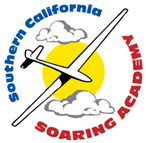 Starting
in January, sailplane instruction, tows and rentals
will be available at CrystalAire Airport (46CN) in
Southern California. Located along the foothills of
the San Gabriel Mountains just North of Los Angeles,
Southern California Soaring Academy is the only
soaring site located in Los Angeles County. Starting
in January, sailplane instruction, tows and rentals
will be available at CrystalAire Airport (46CN) in
Southern California. Located along the foothills of
the San Gabriel Mountains just North of Los Angeles,
Southern California Soaring Academy is the only
soaring site located in Los Angeles County.
The Soaring Academy is a membership-based non-profit
educational corporation and information about the
benefits of membership will be available shortly. A
new web site,
www.soaringacademy.us,
will soon have all the details.
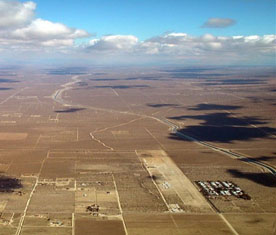 Operating
one Pawnee 260 until late spring, the fleet will
consist of a DG-1000, a DG-505, a Blank L-13, a Grob
G-102 and a Grob-G-103. By summer the fleet will
have expanded to three Pawnees and several more
sailplanes. Operating
one Pawnee 260 until late spring, the fleet will
consist of a DG-1000, a DG-505, a Blank L-13, a Grob
G-102 and a Grob-G-103. By summer the fleet will
have expanded to three Pawnees and several more
sailplanes.
With varied soaring conditions and a tradition
as a premier soaring site, CrystalAire Airport has
long been a favorite of beginning and experienced
pilots alike. The soaring tradition will continue at
Crystal but look forward to expanded community
involvement, seminars, group classes, vacation
packages, escorted cross-country and many social
activities.
Contact Ron
Gregg at
a1@alphaone.us or
+1 (310) 383-9473 for more information. |
|
Cambridge Aero Instruments Update |
|
There have been
several interesting developments in regard to
Cambridge Aero Instruments over the last few months
- all of it good news!
 302
and 302A USB Port and Flash Memory Upgrade 302
and 302A USB Port and Flash Memory Upgrade
In the
previous newsletter, I announced a
new 302/302A flash memory upgrade from Cambridge. They have
now announced a new USB port upgrade as well. Both upgrades
can be done at the same time along with calibration of the flight
recorder for $175. All new units will include the USB port and
memory upgrade. All the units in my stock have been upgraded.
You can get your existing 302 or 302A upgraded by contacting
Cambridge directly.
http://www.cambridge-aero.com
This is fantastic news.
It will be very nice to be able to download flight logs to a PC
through the USB port - especially since most new PCs don't have a
serial port. It is also nice because it shows that Cambridge
is working to improve their products. The 302 will continue to
be a very popular instrument for many years to come.
The Cambridge 302 is the
perfect companion for the new NK ClearNav. In the long run NK
will have a new variometer to use with the ClearNav, but they say
that is at least a year in the future.
|
New -
Sailplane Models
(dozens of them - in stock now) |
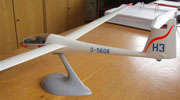 I
have long been a fan of scale sailplane models.
I built a fair number of scale model airplanes in my
youth, and I currently have a scale sailplane model
hanging over my office desk. It is loosely
suspended by thread - giving it the freedom to dance
and sway - as if ever working to find the core
of some great thermal. I
have long been a fan of scale sailplane models.
I built a fair number of scale model airplanes in my
youth, and I currently have a scale sailplane model
hanging over my office desk. It is loosely
suspended by thread - giving it the freedom to dance
and sway - as if ever working to find the core
of some great thermal.
 A
nice sailplane model, like any work of art, is
enjoyable to look at. Sailplanes are certainly
elegant and efficient machines. When I look at
a sailplane model, I see the lovely long wings, and
the purpose built aerodynamically optimized
fuselage, but I also see the history of that
particular sailplane. Every sailplane type has
an interesting history. There was a person, or
group of people, or company that put their hearts
and minds into the development of that particular
sailplane. It may have been the descendent of
many, similar (or quite different) sailplanes in a
long line of sailplanes. I see all that when I
look at a scale model sailplane. I also see
the potential for adventures to come. I see
the cross-country soaring flights that await me in
the future. A
nice sailplane model, like any work of art, is
enjoyable to look at. Sailplanes are certainly
elegant and efficient machines. When I look at
a sailplane model, I see the lovely long wings, and
the purpose built aerodynamically optimized
fuselage, but I also see the history of that
particular sailplane. Every sailplane type has
an interesting history. There was a person, or
group of people, or company that put their hearts
and minds into the development of that particular
sailplane. It may have been the descendent of
many, similar (or quite different) sailplanes in a
long line of sailplanes. I see all that when I
look at a scale model sailplane. I also see
the potential for adventures to come. I see
the cross-country soaring flights that await me in
the future.
 But
sailplane models are more than just fun to look at.
Sailplane models can be a great tool for introducing
the sport of soaring to others. Sailplane
models look great hanging over or sitting on your
desk at work, or sitting in a display counter at the
local gliderport. They are a great way to
encourage friends and colleagues to ask you about
soaring. Just think how many more people would
ask you about soaring if you had one of these models
prominently and proudly displayed! But
sailplane models are more than just fun to look at.
Sailplane models can be a great tool for introducing
the sport of soaring to others. Sailplane
models look great hanging over or sitting on your
desk at work, or sitting in a display counter at the
local gliderport. They are a great way to
encourage friends and colleagues to ask you about
soaring. Just think how many more people would
ask you about soaring if you had one of these models
prominently and proudly displayed!
They are
also great to admire while waiting for your new
full-size glider to be delivered, or while waiting
for spring as your glider is hibernating in its
trailer for the winter.
 Model
sailplane kits are also a great way to promote
soaring with kids. Building a model glider is fun
and a kid that hangs a glider from his bedroom
ceiling is more likely to get into flying gliders in
the long run. Buy one for your kids and
grandkids and nephews and nieces - and help them
build it. I sincerely believe that glider
model kits are a great way to introduce kids to
gliders. Model
sailplane kits are also a great way to promote
soaring with kids. Building a model glider is fun
and a kid that hangs a glider from his bedroom
ceiling is more likely to get into flying gliders in
the long run. Buy one for your kids and
grandkids and nephews and nieces - and help them
build it. I sincerely believe that glider
model kits are a great way to introduce kids to
gliders.
Sailplane
Model Kits
 I
recently debarked on a fun and interesting hunt for
sailplane models, and my hunt has paid off! My
weapon in this hunt was the internet. A few
months ago, the only glider model kits I was aware
of were the very nice
Revell Germany
ASK-21 and LS8-a/18 kits that I have been selling
for a while. But some Google searches and
looking through online model stores around the world
led me to dozens of other model kits. When I
found one brand, I searched for online model stores
around the world that sell that brand. I then
searched their inventory for terms like "sailplane",
"glider", etc. In that manner I found many
other brands of model sailplane kits. I
discovered the wonderful models made by
Ardpol in Poland,
Planet Models and
Czech Master Resin
in the Czech republic, and
Heritage Aviation Models, Ltd.
in the U.K. I found dozens of wonderful and
interesting scale sailplane models. Thanks to
e-mail and the internet I was able to establish
relationship with these manufactures and start
buying their model kits to sell to my customers.
As the kits started arriving from around the world I
put a lot of hard work into scanning multiple images
of each kit - including scans of the raw parts, box
covers and assembly instructions. I also
tried to include a few sentences about the history
of every glider model. It was a lot of work,
and I'm not done yet, but it is a labor of love.
It is fun to document these wonderful kits and make
them available to glider pilots everywhere. I
recently debarked on a fun and interesting hunt for
sailplane models, and my hunt has paid off! My
weapon in this hunt was the internet. A few
months ago, the only glider model kits I was aware
of were the very nice
Revell Germany
ASK-21 and LS8-a/18 kits that I have been selling
for a while. But some Google searches and
looking through online model stores around the world
led me to dozens of other model kits. When I
found one brand, I searched for online model stores
around the world that sell that brand. I then
searched their inventory for terms like "sailplane",
"glider", etc. In that manner I found many
other brands of model sailplane kits. I
discovered the wonderful models made by
Ardpol in Poland,
Planet Models and
Czech Master Resin
in the Czech republic, and
Heritage Aviation Models, Ltd.
in the U.K. I found dozens of wonderful and
interesting scale sailplane models. Thanks to
e-mail and the internet I was able to establish
relationship with these manufactures and start
buying their model kits to sell to my customers.
As the kits started arriving from around the world I
put a lot of hard work into scanning multiple images
of each kit - including scans of the raw parts, box
covers and assembly instructions. I also
tried to include a few sentences about the history
of every glider model. It was a lot of work,
and I'm not done yet, but it is a labor of love.
It is fun to document these wonderful kits and make
them available to glider pilots everywhere.
Finished
Sailplane Models - Extremely Nice!!!
 After
collecting a wide variety of unassembled model kits,
I decided to pursue a relationship with a company
that makes pre-assembled scale sailplane models.
I am very happy to announce my new relationship with
HPH Models of the
Czech Republic. Their artists make amazing
scale model aircraft. Each model they make is
a scale replica of an actual full-size aircraft.
The customer sends them many photos, line drawings
and details of the original aircraft, and HPH makes
an extremely detailed 1:25 scale model of it.
Every detail is matched to the original aircraft.
HPH is the same company that also makes the full
size 304C, 304CZ and 304S and SE sailplanes.
The
models are made of the same materials as the full
size gliders (epoxy resin and glass cloth hand
laminated in negative molds). After
collecting a wide variety of unassembled model kits,
I decided to pursue a relationship with a company
that makes pre-assembled scale sailplane models.
I am very happy to announce my new relationship with
HPH Models of the
Czech Republic. Their artists make amazing
scale model aircraft. Each model they make is
a scale replica of an actual full-size aircraft.
The customer sends them many photos, line drawings
and details of the original aircraft, and HPH makes
an extremely detailed 1:25 scale model of it.
Every detail is matched to the original aircraft.
HPH is the same company that also makes the full
size 304C, 304CZ and 304S and SE sailplanes.
The
models are made of the same materials as the full
size gliders (epoxy resin and glass cloth hand
laminated in negative molds).
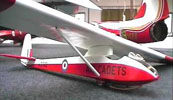 Their
scale model sailplanes are much more expensive than
the sailplane model kits mentioned above, but they
are truly museum quality scale models - to be
cherished and admired for many years. Imagine
having a scale model of your glider sitting on, or
hanging over your desk... Their
scale model sailplanes are much more expensive than
the sailplane model kits mentioned above, but they
are truly museum quality scale models - to be
cherished and admired for many years. Imagine
having a scale model of your glider sitting on, or
hanging over your desk...
For More
Information
To learn more about the many available finished and
unassembled model kits - go to the
Scale Models - Overview and
Tips page. There you will find
links to the many available models, and tips and
links to pages with tips on building scale models.
Below are links to all the models pages.
As you can
see, I am passionate about these models. I
hope you will find these new web pages interesting
and useful. I hope you will get excited about
sailplane models as well. Even if you are not
interested in building a model kit, you may find it
interesting just looking through these kits - it is
like a trip back through the history of soaring. |
|
New
Schempp-Hirth Arcus |
 There
is a new and exciting sailplane that will soon be
announced by Schempp-Hirth. It is called the
Arcus. It is a new 20 m, flapped, 2-seat
sailplane. The fuselage comes from the
DuoDiscus XL (long nose version) but the wing is all
new. There
is a new and exciting sailplane that will soon be
announced by Schempp-Hirth. It is called the
Arcus. It is a new 20 m, flapped, 2-seat
sailplane. The fuselage comes from the
DuoDiscus XL (long nose version) but the wing is all
new.
One of the
most interesting aspects of this lovely new
sailplane is the available electric motor version.
It will eventually be available in the following
configurations:
- Pure
Glider
- Sustainer
- Self-launching (with
gas-powered motor)
- Self-launching (with
electric motor system - from Lange)
I have long
been a fan of the Lange Antares. If you have
ever seen one up close you will know that it is an
amazing work of engineering excellence. The
idea of merging a glider that is similar to the very
popular DuoDiscus (with a new higher performance
wing) with the electric motor and power system from
the Antares is a truly exciting idea. What a
lovely combination!
 I
must admit that, while I see the many benefits of
auxiliary-powered sailplanes, I have never been a
fan of putting smelly and noisy gasoline powered
engines into sailplanes. Electric power is so
much more clean and elegant - and quiet.
Perhaps I am biased by
my background in the
industrial automation/motion control I
must admit that, while I see the many benefits of
auxiliary-powered sailplanes, I have never been a
fan of putting smelly and noisy gasoline powered
engines into sailplanes. Electric power is so
much more clean and elegant - and quiet.
Perhaps I am biased by
my background in the
industrial automation/motion control
 industry, but I
believe electric powered sailplanes are the future.
I look forward to learning more about this
sailplane. I can't wait to fly one! industry, but I
believe electric powered sailplanes are the future.
I look forward to learning more about this
sailplane. I can't wait to fly one!
(I have no business relationship with
Schempp-Hirth or Lange Aviation.)
- Details on the
Schempp-Hirth web site
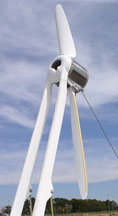 Details
on the Arcus E on the Lange Web Site Details
on the Arcus E on the Lange Web Site
There are no links to the pages below from the main
Lange web site.
Letter
Sent to Select Customers by Schempp-Hirth in Nov.
2008
The text below is from a letter that was forwarded
to me by a soaring pilot in northern Europe.
 "News
Release "News
Release
To those interested in our new 20 m two-seat glider
ARCUS
For several
years now we have been working on the idea of a
completely new concept for a two-seat glider for the
20 m class. Since this idea has developed into
a real project that has taken on concrete form, we
are, in response to many requests, issuing this News
Release to announce our completely new glider which
will be named ARCUS.
In the past
years we have been encouraged by the many
developmental findings and experiences we obtained
from today's great handling single-seat gliders in
know we could incorporate that knowledge into a
concept for a new two-seat glider. Most
important in all this always remained the pure joy
of soaring.
Therefore,
our goal was to develop a glider that would add
significant new elements to the worldwide,
increasingly popular two-seat 20 m class and on the
other hand, give all those who enjoy flying a
two-seater a high performance yet easy to handle and
in many cases and independent alternative.
The achieve
this, the ARCUS will have a completely new
flapped wing. In choosing this profile, both
the wing's geometrical design and the wing's method
of construction were approached in a completely new
way. New calculation and simulation programs
were combined with tested data and trusted empirical
knowledge. Thus, we were able to use a vast
body of state of the art optimization knowledge,
unavailable before.
From all
this information crystallized a beautifully shaped,
rather narrow and, above all, prominently arched
wing surface - first angled forward, then arched
back. This shaped called for the appropriate
name ARCUS (lat. = the Arc).
It is too
early to make claims regarding glide performance.
The first rough calculations however are very
promising.
But the wing
design is not only geared towards glide ratio.
With the use of well proportioned wing surfaces and
harmonized aerodynamics, we tried to achieve the
best possible handling and climb results also under
high wing loading. The flaps play an important
role in this. Especially in the configuration
of self-launcher, the flaps will provide the
additional Ca necessary for a smooth
take-off performance. In addition, the
integrated full span flaperons will provide
impressive maneuverability.
For the
fuselage we are using the new "L" - cockpit already
used in the new NIMBUS-4DLM and DUO DISCUS-xL.
The feedback from our customers regarding its
ergonomics, safety and roominess is overwhelmingly
positive so there will be no open wishes.
To complete
the comfortable ride, we will install the sprung
gear used on the DUO DISCUS-xL with its light and
well braking Beringer wheel.
The ARCUS
will be available in various engine configurations.
In addition to the pure glider configuration - most
likely the standard version - there will also be a
sustainer version using the reliable Oehler-Turbo
system with the Solo 2350-engine and its new
automatic ILEC control unit. As mentioned
earlier, there will also be a self-launching
ARCUS. For this version we will use the
already certified NIMBUS-4DM Binder system with the
Solo 2625-2 engine, from which we expect a superior
take-off performance and climb rate.
As a unique
alternative, we also plan on offering an electrical
version. This will be made possible through
our co-operation with Lange Aviation in Zweibrücken.
This is also where the engine will be installed and
serviced.
The work on
the new ARCUS is in full swing. The
prototype's fuselage has already been built and we
are working on the wing molds at full blast.
Of course, lots of work remains to be done. So
as not to put ourselves under unnecessary time
pressure which may force us to make compromises, we
are not setting a deadline for completion.
Nevertheless, we are working hard to get this new
sailplane in the air in 2009. At this point it
is not sure if we can start the production line the
same year.
We are
sending you this News Release because you have shown
interest in a glider like this in the past.
Even though not all details have been worked out at
this time, we offer you the opportunity to purchase
a position on this new glider. To purchase an
option, please contact your local dealer.
We hope our
concept for this new glider appeals to your and that
we may hear from you again.
Yours
sincerely,
Schempp-Hirth
Flugzeug-Vertriebs-GmbH
P.S.
If you are interested in the electric version of the
engine and have questions about the technology used
and options available, we ask you to contact Lange
Aviation directly." |
|
New K6
Bt BlueTooth Adapter |
 The
K6 Bt BlueTooth Adapter allows soaring instruments
to establish a wireless connection to BlueTooth
enabled PDAs and PNDs (Personal Navigation
Devices). The
K6 Bt BlueTooth Adapter allows soaring instruments
to establish a wireless connection to BlueTooth
enabled PDAs and PNDs (Personal Navigation
Devices).
Recent Pocket
PCs and other user interface devices do not have
RS-232 serial ports - making it difficult to connect
them with soaring GPS units. However, most current
PDAs (Pocket PCs and Palm devices) and PNDs
(Personal Navigation Devices - such as the HP
iPAQ 310) do have a built-in BlueTooth radio. But no
soaring GPS offers BlueTooth capability - which is
where the K6 Bt comes in. The K6 Bt is a BlueTooth
transceiver which makes it possible for soaring GPS
and flight computer units to talk through the K6 Bt
over BlueTooth to the PDA or PND. It is a 2-way
communication so data such as MacCready and water
ballast settings can be exchanged between the PDA
and soaring flight computer. The BlueTooth
connection is even password protected so that it
cannot be intercepted or received by another device.
Example
Systems Using the K6 Bt
(Click on the images below to view
larger versions.)
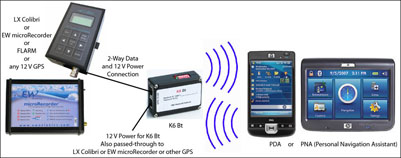

Comm Port Baud Rate Switching
Some soaring GPS, flight recorder and flight computer products
automatically switch baud rates when doing jobs such as transferring
waypoints, task declarations and flight logs. The K6 Bt has
established a freely available protocol which makes baud rate changes
possible, as long as the software on the PDA is setup to support the
baud rate switching.
Compatibility - PDA or PND
Most current PDAs (such as the iPAQ 110/111/112, or iPAQ 210/211/214) and PNDs (Personal
Navigation Devices - like the HP iPAQ 310 series) have BlueTooth
radios built in. Any device with a built-in BlueTooth radio should
work fine.
Compatibility - Soaring GPS or Flight
Computer or GPS Flight Recorder
Any soaring instrument with a standard RS-232 serial port (every one I
can think of) should work fine - as long as the soaring software on the
PDA or PND supports the K6 Bt and the desired soaring instrument.
Great for 2-Seat Gliders!
The K6 Bt makes it much easier to install a PDA in
the back seat of a 2-seat glider. The
BlueTooth radio signals can reach easily from the
nose of the glider to the PDA in the back seat.
Therefore, there is no need to run PDA power/data
cables from the nose of the glider to the back seat.
However, a K6 Bt unit is required for every PDA.
It is not possible for more than 1 PDA to talk to a
K6 Bt. It is possible to connect 2 K6 Bt units
to a single soaring GPS unit (such as a Cambridge
302, or LX Colibri, or EW microRecorder, etc.).
Another thing to consider is that the PDA's built-in
battery may not last through a long glider flight.
See the note
Power for the PDA or PND
below for suggestions.
Compatibility - Soaring Software
It appears that special communications protocols are used - especially
where baud rate switching is required. Therefore, the K6 Bt will
only work with soaring software that is customized to work with the K6
Bt. SeeYou Mobile has been tested and works well for sending
GPS data to the PDA and exchanging MacCready and other data between the
PDA and a Cambridge 302. However, at this time I have not been
able to successfully send a task declaration from SeeYou Mobile to a
Cambridge 302 or download a flight log from the 302 using SeeYou
ConnectMe. SeeYou says they are certain those functions will be
working soon. I tested using iPAQ hx4700, iPAQ 210 and iPAQ 310
units and a Cambridge 302. I was not able to establish a
connection between the 302 and the PDA or PND when using Glide Navigator
II or the Cambridge 300 Utility. It may be that I just need to
more testing. It is my understanding that the Cambridge 300
utility doesn't work with the K6 Bt because the baud rate is changed for
flight log downloads. The K6 Bt can handle that, but the Cambridge
300 Utility does not support the K6 Bt. I would think that Glide
Navigator II would work with the K6 Bt since there is no baud rate
switching, but so far my tests showed that it did not work.
Power for the PDA or PND
Although there is no data cable connection to the PDA or PND, you will
probably want to power the device with 5 V power to ensure that it will
have enough power to last through a long soaring flight. Two good
options for providing 5V power would be the
Goddard PS-5a or the
Socket Mobile Power Pack.
Nimbus cradles
can be purchased with a DBCAI connector for connection to the Goddard
PS-5a or a USB-A connector for connection to the Socket Mobile Power
Pack.
Specifications
|
Size: |
2.80 x 1.97 x 1.14 in (71 x
50 x 29 mm) |
|
Weight: |
2.0 oz. (57g) |
|
Input Power: |
5 to 14V, 25 mA (Standby)
and/or 40 mA (transmit mode) |
|
Baud Rates: |
2400, 4800, 9600, 19200, 38400,
57600 and 115200 Baud |
Power/Data Cables
Cable-K6Bt-Pwr-2
Cable-K6Bt-302-0.3
Cable-K6Bt-302-0.3-miniUSB-1
Cable-K6Bt-Colibri-0.3
Cable-K6Bt-EWmicroRec-0.3
Cable-K6Bt-FLARM-0.3 (also works with Volksloggers)
Example Systems
Cambridge 302 with K6 Bt and iPAQ 310
Cambridge 302A with K6 Bt and iPAQ 310
EW microRecorder with K6 Bt and iPAQ 310
LX Navigation Colibri with K6 Bt and iPAQ 310
Links
Video showing the establishment of
a data connection between an iPAQ 314 and a FLARM unit - using a K6 Bt
BlueTooth connection.
-
Details
|
|
"Friends of CSI"
Update - Please Join the Club |
|
In May of this
year I announced the new "Friends of Cumulus
Soaring, Inc." club. It is truly a win-win
arrangement in which discounts, free shipping, free
phone support, and interest are given in exchange
for loans to my company. I am extremely
grateful to the generous soaring pilots that have
joined the club since then.
I am still
hoping that many more glider pilots will show their
support by joining the "Friends of Cumulus Soaring,
Inc." club. The loans received so far have
been a great help, but I still have a long way to go
in regard to reducing my high interest rate bank
debt. Please consider joining the club. There
are many good reasons to join.
You can
learn more about the "Friends of Cumulus Soaring,
Inc." club here:
http://www.cumulus-soaring.com/friendsofcsi.htm
|
|
New
Alexander Schleicher ASH 31 Mi |
 Alexander
Schleicher has just announced an exciting new
auxiliary-powered sailplane - the ASH 31 Mi.
It is unlike any other sailplane on the market
because it can fly as either an 18 m or 21 m span
sailplane. What a clever idea! 20 years
ago gliders were stretching their 15 m wings to
16.5, 17.5 and then 18 meters. After a while,
nearly every 15 m span glider was available with "18
m tip extensions". That way the glider could
be raced as a 15 m glider and flown recreationally
with quite a bit more glider performance in 18 m
mode. Eventually the 18 m span became very
popular so that now there is a popular 18 m FAI
racing class. Some of the latest 18 m racers
can be flown in 15 m mode also (ASG 29, Ventus 2cx,
etc.). Now that it could be said that 18
meters is the norm, Schleicher has designed a glider
that can race as an 18 m ship, and also race in the
Open Class as a 21 m span glider. I imagine
that pilots that put on their 18 m wingtips for
"recreational" flights 10 years ago will now put
their 21 m wingtips on for "recreational" flights.
It appears that this sailplane is targeted at the
same type of pilots that snatched up about 250
ASH-26 E. It looks like a lot of fun to me! Alexander
Schleicher has just announced an exciting new
auxiliary-powered sailplane - the ASH 31 Mi.
It is unlike any other sailplane on the market
because it can fly as either an 18 m or 21 m span
sailplane. What a clever idea! 20 years
ago gliders were stretching their 15 m wings to
16.5, 17.5 and then 18 meters. After a while,
nearly every 15 m span glider was available with "18
m tip extensions". That way the glider could
be raced as a 15 m glider and flown recreationally
with quite a bit more glider performance in 18 m
mode. Eventually the 18 m span became very
popular so that now there is a popular 18 m FAI
racing class. Some of the latest 18 m racers
can be flown in 15 m mode also (ASG 29, Ventus 2cx,
etc.). Now that it could be said that 18
meters is the norm, Schleicher has designed a glider
that can race as an 18 m ship, and also race in the
Open Class as a 21 m span glider. I imagine
that pilots that put on their 18 m wingtips for
"recreational" flights 10 years ago will now put
their 21 m wingtips on for "recreational" flights.
It appears that this sailplane is targeted at the
same type of pilots that snatched up about 250
ASH-26 E. It looks like a lot of fun to me!
The prototype
of the ASH 31 Mi is currently being built. The
maiden flight is planned for the first half of 2009.
The start of the serial production has been
scheduled for the beginning of 2010.
(I have no business relationship with
Alexander Schleicher.)
-
Details
|
|
Dick
Butler's Concordia |
 I
recently found this interesting article about
Richard Butler's super-sailplane - the Concordia.
It is not a new article, but it is still very
interesting. The article was written by
Wolf Herold. His interesting web site is
here. I
recently found this interesting article about
Richard Butler's super-sailplane - the Concordia.
It is not a new article, but it is still very
interesting. The article was written by
Wolf Herold. His interesting web site is
here.
-
Concordia Article
While looking
through Wolf's web site (the English version) I
found the link to his interesting "home video" of
the Mountain Wave Project.
-
Mountain Wave Project web site
-
Video of Mountain Wave Project
Trip |
|
SALE
Items |
 New
United Instruments Altimeter - 20,000 ft, Kollsman
in inHg New
United Instruments Altimeter - 20,000 ft, Kollsman
in inHg
I have overstocked these units.
They are less than 1 year old and in perfect
condition. $725 (normally $860)
Discounted Units Sold Out
-
Details
 Used ILEC SN10-2 2nd-Seat Repeater: $620 Used ILEC SN10-2 2nd-Seat Repeater: $620
This unit had the screen replaced at ILEC in Germany
last spring and was lost in transit for many months.
It is in perfect working condition. This is a
fantastic deal for someone that wants a spare backup
unit, or has a 2-seat glider that needs a 2nd seat
repeater to go with an existing SN10B in the front
seat. The RAZ vario meter is not included but
is available for $175. The required wiring harness
is not included but is available
for $80. For a total of $620 + $175 + 80 =
$875 you get a complete system. That is
$620 off the $1495 price of a new system.
Note: This is not an independent SN10 system.
It is the 2nd-seat "slave" to an SN10B.
Please send me an e-mail if you are interested in
buying it. You can see details on the SN10-2 here:
http://www.cumulus-soaring.com/ilec.htm#SN10-2
 Winter
MacCready Ring for Pik 20b Winter
MacCready Ring for Pik 20b
This ring was ordered in the wrong size. It is
designed for use on a standard 57 mm Winter W-5453
variometer in knots. It does not include a
bezel ring, but they are available if necessary. Most Winter
variometers made in recent years already include the necessary grooved
bezel ring. A set like this one normally
sells for $83. I am selling it
for $45.
- Details
 Winter
MacCready Ring for
304 CZ - 17m Winter
MacCready Ring for
304 CZ - 17m
I'm not sure how I ended up with this extra ring,
but I don't need it. It is
designed for use on a standard 57 mm Winter W-5453
variometer in knots. It does not include a
bezel ring, but they are available if necessary. Most Winter variometers
made in recent years already include the necessary
grooved bezel ring. A set like this one normally
sells for $83. I am selling it
for $45.
- Details
 Soaring
Beyond The Basics - 1st Edition Soaring
Beyond The Basics - 1st Edition
Since the 2nd Edition of "Soaring Beyond The Basics" is now available,
and I have a few of the 1st edition remaining in stock, I am selling the
1st edition versions for $6 each. Or you can buy both
versions for $24.95 and give the old one to a soaring friend, or leave
it at the gliderport.
-
Details
|
|
Sailplane Postage Stamps |
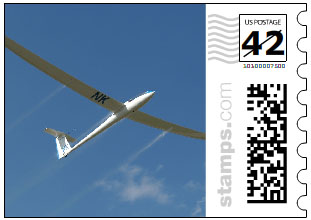 In
the Winter 2008 edition of "Bungee Cord", the
newsletter of the
Vintage Sailplane Association,
Simine Short proposed a very interesting idea.
Use your favorite soaring photo to create soaring
postage stamps! The service is available at
http://photo.stamps.com.
You can upload any image you choose, arrange it as
desired, and order your own stamps. Of course
they are accepted by the U.S. Postal Service as
standard postage. Several postage amounts are
available. I created the stamp shown above in
a few minutes. Of course, they do cost more
than twice as much as the stamps you buy at the post
office, but they are a great way to promote soaring.
You do save a little when you order 2 sheets of 20
stamps. 40 stamps came to $36.97 including
$2.99 for shipping. That is 92.425 cents for
each 42 cent stamp. Feel free to use any of
the photos found here:
http://www.cumulus-soaring.com/contest.htm. In
the Winter 2008 edition of "Bungee Cord", the
newsletter of the
Vintage Sailplane Association,
Simine Short proposed a very interesting idea.
Use your favorite soaring photo to create soaring
postage stamps! The service is available at
http://photo.stamps.com.
You can upload any image you choose, arrange it as
desired, and order your own stamps. Of course
they are accepted by the U.S. Postal Service as
standard postage. Several postage amounts are
available. I created the stamp shown above in
a few minutes. Of course, they do cost more
than twice as much as the stamps you buy at the post
office, but they are a great way to promote soaring.
You do save a little when you order 2 sheets of 20
stamps. 40 stamps came to $36.97 including
$2.99 for shipping. That is 92.425 cents for
each 42 cent stamp. Feel free to use any of
the photos found here:
http://www.cumulus-soaring.com/contest.htm. |
|
Tennessee
Ridge Soaring Video |
The note and
links below are from Rand Baldwin in Madison,
Alabama.
http://www.youtube.com/watch?v=INP9nOiiiuQ
 (To
watch it in high quality, click on 'watch in high
quality' below the lower right corner of the video
window. For a full-screen view, also click on the
rectangle immediately to the right of the speaker
icon and just above the quality click area.) (To
watch it in high quality, click on 'watch in high
quality' below the lower right corner of the video
window. For a full-screen view, also click on the
rectangle immediately to the right of the speaker
icon and just above the quality click area.)
The link above is to a 10-minute video taken by
Michael Poe of Nashville, TN last Sunday (December
21, 2008), when he and two other Eagleville (Puckett
Field, TN) pilots flew ~400 miles along the
Sequatchie Valley and Lookout Mountain ridges.
Michael flew his ASW-20, Werner Ruegger his LS3, and
Bob Richard an ASW-27. Cloudbase was about 6,000'
MSL, so they had no trouble jumping the ~14-mile
non-landable gap between the south end of the Valley
and Lookout Mountain below Chattanooga. Check out
the
Google Earth file
showing the view north from the south end of the
Sequatchie Valley.
 The
flights are posted on the
OLC Web site. The
flights are posted on the
OLC Web site.
Bill Elliott and I flew the a similar route during
our 2006 and 2007 national record flights, although
we had to leave the ridges and thermal to a
turnpoint near Oak Ridge, TN to achieve our declared
distance.
Rand
Below is Michael Poe's description of the flight:
Bob, Werner
and I got a tow from Marion yesterday courtesy of
Chilhowee glideport. Launched around 10am (we could
have gone an hour earlier) and flew 400 miles on the
Sequatchie and Lookout ridges. Was a personal best
distance for all three of us on the shortest day of
the year.
No records
were set - had some technical glitches with the
declarations
Winds on the ridge were 300 @ 20knots most of the
day - got stronger at the end to 26 knots..
Flew to Crossville Y, then back to Marion - the
transition to Lookout was a breeze - 5 - 7 knot
thermals to 6000 msl yesterday right where we needed
them.
We all went south on the little ridge to about 7
miles from the end of the ridge near Gadsden, AL. We
basically flew 'til we were down to about 1500msl -
700 agl or so - and 65 knots - there were no cu's so
we decided to turn back as it would have been
difficult to reach all the way to Gadsden airport.
The little ridge south of Gadsden was extremely
turbulent compared to the ridges north of Ft Payne
and Sequatchie - think we were flying thru rotor
coming off the mini-ridges to the upwind side. We
actually found some wave action flying in the valley
between the two ridges.
Transition from Lookout went off good as could be -
still had nice cu's to mark the route over the 12
miles of no mans' land.
Then back to Hinch mtn and home to call it a day.
Was probably the most fun I've ever had on a flight.
The three of us stayed together the whole day except
when Werner got stuck on Lookout mtn at the end. He
still was able to find a good thermal at 4:15pm EST
to make it back over.
Was great practice for the 1000 k attempts earmarked
for the spring.
cheers,
Michael |
|
ChicagoLand Glider Council Seminar |
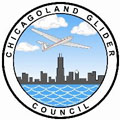 Overview Overview
The ChicagoLand Glider Council is sponsoring a day
long spring soaring and safety seminar open to all
soaring pilots. Safety, medicine, racing,
competition, gear, gliders and gab will be on the
agenda.
The ChicagoLand Glider Council is a non-profit
organization of over
200 members which was formed in 1937 and has a long
history of
dedication to the advancement and safety of soaring
flight. The
Council hosts off-season (October through April)
meetings with
scheduled speakers and refreshments at a local
venue. The Council
also provides youth grants and helps underwrite
local soaring events.
Date
Saturday, February 21st, 2009
Times
7AM - Doors open for registration
7AM-8AM - Continental Breakfast buffet
8AM - Seminar begins SHARP!
Location
 The
location of the seminar is Elgin, Illinois
(northwest of downtown Chicago) along Rt 90 at the
Business Conference Center of Elgin Community
College’s impressive and modern Seigle Auditorium. The
location of the seminar is Elgin, Illinois
(northwest of downtown Chicago) along Rt 90 at the
Business Conference Center of Elgin Community
College’s impressive and modern Seigle Auditorium.
Confirmed Speaker List
John Cochrane - Competition & Cross Country Soaring
Dr Dan Johnson (AME) - Aviation Medical Issues
Jim Short and Dave Schuur - Vintage Soaring Aviation
Paul Remde - Soaring Electronics
Trace Lewis and Scott Manley - Condor Soaring
Virtual Reality
Demonstration
Registration Form
Costs, hotels, directions, etc - see
http://chicagolandglidercouncil.com/seminar/
Thanks,
John DeRosa
President, ChicagoLand Glider Council
john@derosaweb.com
Minnesota
Glider Pilots,
I'm (Paul
Remde) planning to drive down to Chicago for this
event. Does anyone want to join me for the 6
hour drive? We could also split the cost of a
hotel room.
Paul Remde |
|
New
Products |
|
The products
below have recently been added to my web site and
inventory. Click on the images and links below
to go to the product pages.

Larsen Base
Station Antenna
5/8 Wave Antenna
For use on RV or SUV, etc.
New ILEC SN10
Wiring Harnesses
for use with EW microRecorder
SN10b-Pnl-PDA-EWmicroRec-1
Mod-SN10b-Pnl-EWmicroRec-1
SN10b-Pnl-EWmicroRec-1




New Second
Edition



Free
Download

Free
Download |
|
New
Printable Video and Book Catalog |
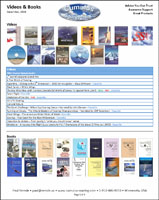 Sometimes it is
nice to be able to print a complete list of the
available soaring books and videos. The PDF file
below is just such a list. You can use it to
highlight books and videos to be purchased by
friends and family members as gifts. Sometimes it is
nice to be able to print a complete list of the
available soaring books and videos. The PDF file
below is just such a list. You can use it to
highlight books and videos to be purchased by
friends and family members as gifts.
Videos-And-Books-Printable.pdf
Other Catalogs
In the future I plan to create a similar catalog
that lists all the products I sell. In the
meantime, please print and review the online
catalogs here:
-
Catalog by Manufacturer
-
Catalog by Category
I bet you
will see several products that you didn't know were
available from Cumulus Soaring, Inc.
|
|
OLC
Convention in the USA in 2009 |
|
The On-Line
Contest will be hosting the OLC Convention USA 2009
in San Diego CA. The convention will be located at
the Hilton Hotel San Diego Airport/Harbor Island
from 2pm-5:30pm.
-
Details
|
|
Parachute Repack Cycle Extended |
|
It has taken a
long time for this to go through, but finally, as of
December 19th, 2008, the mandatory parachute packing
interval has been lengthened for 120 days to 180
days. This is great news!
-
Details
|
|
Low
Cost Pulse Oximeter Options |
|
Pulse oximeters
are a fantastic investment in safety. They
measure your blood oxygen saturation level - which
is very important when flying gliders at high
altitude. The great news is that there are
several extremely low cost options available.
There is no good excuse not to use one. I
don't currently stock or sell pulse oximeters, but I
do hope you will buy one if you plan to fly at
altitudes requiring oxygen.
Eric Greenwell
recently found some very interesting options for
pulse oximeters and posted them on the
rec.aviation.soaring newsgroup. I did some research
and found some similar items. They are listed below.
The last one sounds very interesting to me because
it mounts on your arm (making much more comfortable
in flight) and it offers alarms. The alarms would be
very nice because the unit could warn you if your
oxygen level was getting too low.
|
|
Pipistrel Adds Apis to Product Line |
The text below
is from the
Pipistrel USA Newsletter
(I have no business relationship with
Pipestrel.)
Multiple World
Record holder the Apis is a high performance
single-seat 15m glider and advanced light aircraft
with self launching capabilities. With the
addition of the Apis to the product line, Pipistrel
is now the most dynamic small aircraft producer IN
THE WORLD and the ONLY AIRCRAFT PRODUCER offering
both single-seat and two-seater side-by-side
self-launching gliders, two-seat motorgliders, UL
two-seat go-the-distance aircraft, trikes and
propellers.
Previously produced by AMS Flight d.o.o. under a
license arrangement with a Pipistrel, the Apis
project has been completely acquired by Pipistrel
and all operations, production and ordering are now
handled entirely through Pipistrel.
The Apis aircraft is currently undergoing a massive
redesign to productionise the aircraft for serial
production with many new introductions including
retractable undercarriage, much larger cockpit,
electric engine option etc. More information
on the Apis aircraft will be available early 2009
with orders currently being accepted for deliveries
starting in February 2009. |
|
XCOM
Panel Mount Radios to Be Made In the USA |
 Wednesday,
October 15, 2008 Wednesday,
October 15, 2008
“Narco Avionics and XCOM Avionics, Manufacturing
Partnership Agreement
Fort Washington, Pennsylvania – USA. Mr. Michael
Coates, CEO and President of XCOM Avionics and Mr.
Alan Hanks, CEO and President of Narco Avionics,
Inc. have announced their October 9, 2008 signing of
a “Joint Manufacturing Agreement”, whereby Narco
Avionics, Inc. will Manufacture, Inventory, Service
and Support, the XCOM Avionics, XCOM VHF 2 ¼” COM
Transceiver.
All manufacturing and support operations will be
conducted from the Narco Avionics, Inc. Fort
Washington, Pennsylvania Manufacturing Plant by
regular Narco Avionics Employees and will be
supported by XCOM Avionics, a well known Australian
Company, Engineering and Technical Support
Personnel.
Coates and Hanks have both expressed great
enthusiasm for the new venture and acknowledged very
positive feelings about future program expansion
possibilities including several new product lines
and ongoing product certification.
XCOM Response
Since the radios inception the XCOM has been
built in Australia with a large majority
(approximately 90%) of our product being shipped
internationally with most of this going to the USA.
Production issues in Australia have forced us to
look for another manufacturer, we tried several
manufacturers in Australia but none of these could
offer reliable and quality production which
basically meant we had a fantastic product that was
being let down by poor manufacturing which was out
of our control. The best way around this is to find
a manufacturer who is already familiar with avionics
and has the ability to manufacture correctly to TSO
standards, will stand behind their work and most
importantly take pride in what they are doing!
For this reason we have entered into a cooperation
with Narco Avionics who are the world's longest
standing avionics business. This partnership gives
XCOM the complete confidence that our product will
be manufactured and tested beyond the standards
which are required for efficient and continuous,
long-term , durable operations. It really means we
can stand behind our product with more confidence
than ever before and it also gives Narco exposure to
the LSA, experimental and Ultralight market which is
rapidly expanding.
For our customers, it gives you the confidence that
the product is being made in the USA to the same
standards that Narco currently produce too. It gives
you a local service centre which is able to commit
fully to the repair or updating of XCOM radios (if
required) and it also means that the price to our US
customers will come down because most of the parts
that are used in the XCOM radio are actually sourced
from the USA, then sent to Australia (which costs a
lot of money in freight) produced into the radio and
then shipped back to the USA (which costs a lot of
money in freight) overall our customers will find a
number of improvements which include better customer
service because they are not geographically isolated
on the other side of the world, delivery and repair
times will be quicker and the price of the radio
will come down.
Overall the future for XCOM Avionics and our
customers is strong and we really appreciate the
ongoing support of our customers.
-
Details on the XCOM Radio
|
|
News
from Naviter |
Naviter has
released version 3.9 of SeeYou (for the PC).
The new features include:
- 18 new
glider models for the 3D View

Duo Discus and Nimbus 4

Schweizer 1-26
-
Autoselection of a glider model for 3D
- Order
your own personalized glider model
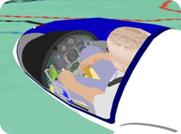
- Added
option for Start on observation zone entry
The new 3D
sailplane models are:
- ASH 25
- ASW 20
- ASW 28
- DG 100
- DG 1000
- DG 800
-
Schempp-Hirth Cirrus Standard
-
Schempp-Hirth Discus 2
-
Schempp-Hirth Duo Discus
-
Schempp-Hirth Ventus 2
-
Schempp-Hirth Nimbus 4
- Jantar
Standard
- Blanik
L-13
- Lak 19
- LS 4
- LS 8
- PW 5
-
Schweizer 1-26
The new 3D
models are a lot of fun. It is interesting to
view one of your big flights as if you were flying
it in a Nimbus 4, or a Schweizer 1-26.
The great news
is the anyone using SeeYou 3.0 or higher can upgrade
to version 3.9 for free. What a great
Christmas present!
Tip: To
get the new 3D gliders to appear in the 3D view
- Install
version 3.9
- Go to:
Tools/Options/3D View/Symbol/Style: Custom (or
Autoselect)
- Symbol
File: c:/Program Files/Naviter/SeeYou/Models
-
Details
 SeeYou
Mobile for iPAQ 310 SeeYou
Mobile for iPAQ 310
The iPAQ 310 is a PND (Personal Navigation
Device) with a large, high-resolution screen.
Naviter is in the testing phase of a new version of
SeeYou Mobile that runs on the iPAQ 310. I've
tested it a bit and I'm very excited about it.
Since the iPAQ 310 has a built-in GPS (and street
maps of entire countries) it makes a great portable
soaring flight computer system. I believe they
have enough beta testers at this time.
Hopefully it will be released in a few weeks.
-
Details on the Naviter web
site
- iPAQ
310 Overview on
PDA/PND Comparison page
- iPAQ 310 Example System on
PDA/GPS Example Systems page
Example Systems
-
Cambridge 302 with K6 Bt and iPAQ 310
-
Cambridge 302A with K6 Bt and iPAQ 310
-
EW microRecorder with K6 Bt and iPAQ 310
-
LX Navigation Colibri with K6 Bt and iPAQ 310
|
|
DG-1000 M |
 DG
announces the new self-launching version of the
popular DG-1000. DG
announces the new self-launching version of the
popular DG-1000.
I have been
fortunate to have 2 good friends who own a DG-1000.
They have both taken me with them on many soaring
adventures in it. It is a lovely sailplane.
A self-launching version is very interesting!
-
Details
|
|
Fun
and Interesting Links |
|
Below is a
collection of fun and interesting soaring links.
Mt. Rainier
wave photos:
http://www.komonews.com:80/weather/blog/35631614.html
Cool winch launch photo
Fun soaring
video:
http://pl.youtube.com:80/watch?v=nVDqjGeiHGQ
Cool 1/4 scale
model with extreme detail, amazingly documented. Be
sure to see all the pages by clicking the numbers.
http://www.retroplane.net/frankfort-model/page1.htm
http://www.retroplane.net/cinema2/accueil.htm
Movie
final:
http://www.retroplane.net/frankfort-model/page11.htm
assembly and flights:
http://www.retroplane.net/videos/1er-Vol-Frankfort.wmv
Other awesome scale models
http://www.retroplane.net/index.htm
1/2 scale
DG-1000 by Simon Cocker of the U.K.
Link 1,
Link 2,
Link 3,
Link 4,
Link 5
other interesting scale models:
Link 1,
Link 2
Crazy gliders:
http://www.youtube.com/watch?v=Z1FCN_wcO08
Neat old
soaring photos- link from the VSA mailing list.
Thanks Josh
http://images.google.com/images?q=Aircraft+Gliding+source:life
Interesting rare aircraft - Thanks Dan Shallbetter
http://rareaircraf1.greyfalcon.us/UNITED STATES.htm
from Dan
http://rareaircraf1.greyfalcon.us/
Tony Condon
Cherokee II landout video:
http://www.youtube.com:80/watch?v=5IjZZTsgUAI
Boeing 707
Barrel roll
http://www.youtube.com/watch?v=WJ546BEps-M
Gliders into
camping trailers (caravans):
http://www.youtube.com/watch?v=tCkzxOcwg_Q
http://archive.oxfordmail.net/2001/5/9/63207.html
Stanford Helicopters Learning
http://news-service.stanford.edu/pr/2008/pr-heli-091008.html
http://www.youtube.com/watch?v=M-QUkgk3HyE
Interesting
photos - not soaring related:
Link
Dynamic soaring
(models) videos:
http://vimeo.com/1950667
http://vimeo.com/1952010
Excellent
Soaring video by Sebastian Kawa:
http://www.youtube.com/swf/l.swf?video_id=55PrYJUEK0A
|
|
Coming
Next Month |
-
More fun links and soaring news from around the
world
|
|
Wrap
Up |
Thank you for
taking the time to read this newsletter. I hope you
have found it interesting. If you did, please tell
your friends about it. Please mention it in
your local soaring newsletter. Please direct
them to:
http://www.cumulus-soaring.com/newsletters.htm
I consider myself a servant. Please let me know if
there is anything I can do to help you find the
right soaring instruments for your needs, or help
you learn how to use an instrument or software
product. Also, let me know if you have any
suggestions for products or services to add to my
web site, or ways that I can serve you better.
I feel blessed because I love my job. I enjoy
serving the soaring community. Like you, I am
passionate about soaring. Thank you for your
business, I sincerely appreciate it.
Fly Safe,
Paul Remde
|
|

